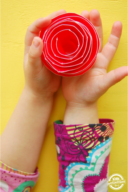If you are
teaching responsibility to your child, you know that it can be a long road, but it can be so worth it! Raising a child that takes care of themselves and
cares about others is so important.
Forgetting homework, not cleaning their room, losing their shoes, forgetting to take their lunchbox… the list goes on and on. Hopefully, these things get better with age, but it is up to us to help them until then.
We need to
teach our children how to be responsible. So often, we find ourselves doing these things for our children and coming to the rescue because it is easier or faster and because we love them, but we aren’t helping them in the long run.

If we truly want to be teaching
responsibility, we need to be guiding them in the right direction. Here are a few suggestions to help your child be more responsible:
- Try a “parent-free” night on a weekend. This means that you are home and still supervising, but you stop doing everything for one night. Talk to your kids about it beforehand. On the morning of parent-free day, stop doing it all. Do not cook, clean, help with chores (well- you will still do things like handle any medicine and hot foods, etc…) The point of this exercise is to let your child see how much you are doing and help them try to be more responsible for their things. Sit down at the end of the day and ask them if they can see how much you need their help. Ask them if they have any ides of where they could help out more around the house.
- Play “I am responsible.” This is where you have a list of 10 questions and each person gets to pick one question to answer (write the questions on strips of paper — each child takes one strip of paper, until they are all gone). Go around to every family member and ask the question on their paper. Each person comes up with an answer to their scenario.
Examples of scenarios:
1. I let the dog out and he got muddy. What can I do?
2. I left my homework by the dinner table and I spilled sauce on it? What can I do? What should I have done?
3. I forgot to pick up my toys and my mom tripped on them. What can I do?
- Try not to make excuses for your child. This can make it worse for your child.
- If your child makes excuses, remember that it is a way for them to shift the focus from the responsibility to the excuse. They may not even be aware that they are doing this.
- According to James Lehman, when you say, “Why didn’t you do your homework,” the parent is really asking, “Why didn’t you meet your responsibility? When your child says, I forgot to bring my book home again, he’s really saying, It’s not my fault that I didn’t meet my responsibility. You need to respond by saying, We’re not talking about whose fault it is, we’re talking about whose responsibility it is. In that way, you can shift the focus back onto the child’s responsibilities and you won’t get stuck in an argument about the nature of the excuse. If the child makes excuses about misbehavior, respond, We’re not talking about why you misbehaved, we’re talking about why you didn’t meet your responsibility. If you argue or debate about the excuse, you’re simply encouraging your child to come up with bigger and better ones. ~EmpoweringParents.com
- Start early, with simple chores and responsibilities when they are young. You don’t want to have a 12 year old asking you to make their bed or get them cereal in the morning.
- Let them be your partner. Our kids loved helping me as toddlers and preschools, so that now they can do it on their own. Guide them and teach them while they are helping you.
- Be someone that they want to imitate. They try to be like superheroes and actresses… they also try to be like you. Give them a great example to follow.
- Don’t expect perfection. If you expect too much and your child fails to reach it, he will feel like a failure. Make your bar high, but obtainable.
- Do NOT bribe them … well, we know that sometimes we all bribe our kids (“If you are good at the store, we can buy gum at the end.”) Try not to bribe them for chores or doing what they should be doing to help the family or themselves.
- Do If… Then. IF you clean up your room, THEN you can play outside.
- Let your child fall. This one is hard… OH yes, I know! I read one time that you can tell a child over and over again not to step on the slippery rock, but until they do it themselves and fall, they will always want to try it. Sometimes, if there is a small lesson that can teach a bigger one, it is OK to let them fall.
- Make them repay you. How many times do we tell our kids that we will let them have this toy, but they have to pay us later… only to forget? I have done this several times. We need to try to remember. If they do not repay us, we should return the toy. It is better to learn this lesson over a toy than over a mortgage.
- Hold them accountable. If your child joins a team or makes a commitment, talk to them about why they need to keep it (they would let their team down, they would be not pulling their weight, etc…) Plus, most sports are only a season, showing the child that they can do it and make it until the end.
The
hardest part about teaching a child to be responsible is not running to their rescue. I am a mom, so I know how much we want to swoop in and save the day. I can’t even recall how many times I’ve taken lunch boxes, forgotten homework and fundraiser money to the school in the middle of the day.
I can’t tell you how many times I have searched for 15 minutes for a lost shoe or a lost baseball mitt. Helping is a great way to show our kids that we care and teach them to be empathetic, but we also need to hold them responsible for their own things… and this is where the
hard part of parenting comes in.
I would love to hear your suggestions!
Join us on Facebook and share your advice to our many reader questions.
 If we truly want to be teaching responsibility, we need to be guiding them in the right direction. Here are a few suggestions to help your child be more responsible:
If we truly want to be teaching responsibility, we need to be guiding them in the right direction. Here are a few suggestions to help your child be more responsible:





















0